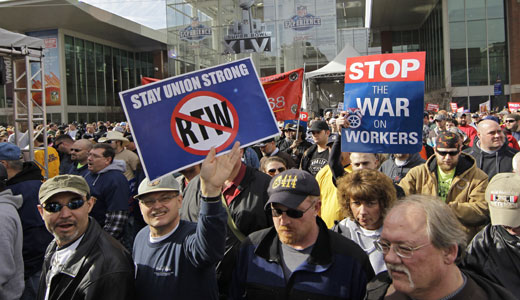
A pro-labor economist is saying that Republicans who think “right to work” laws will stimulate the economy in their states are dead wrong.
He says they are wrong, however, not just for the reasons given by unions – that the laws lower wages and depress the amount of money going into the local economy – but because the “free trade” laws now in place actually make even “right to work” states look less attractive to those who can profit more by outsourcing jobs.
Gordon Lafer, an economist at the University of Oregon’s Labor Education and Research Center, told American Prospect’s Abby Rappaport yesterday that while 23 states have right-to-work legislation, to adequately judge their impact one must examine states that became right-to-work states after the North American Free Trade Agreement became law.
“Anything before the impact of NAFTA started to be felt in the late ’90’s is meaningless in terms of what it can tell us,” he says.
Lafer’s argument, which is being accepted in more and more business circles and even by some Republicans, is that, because of free trade deals, firms outsource jobs to places where they can make things at a tiny fraction of what it would cost to in America. He says that even in the most anti-union state in the country there is still a minimum wage law, for example, that some greedy business owner will see as an impediment to his profits. “The wage difference that right-to-work makes is meaningless compared to the wage savings you can have leaving the country,” Lafer said.
Last year, Lafer and fellow economist Sylvia Allegreto published a report for the Economic Policy Institute examining in detail what had happened in the ten years since Oklahoma passed a “right to work” law. Since it is the only state that has passed “right to work” since NAFTA, they say it gives a good picture of the effects of right to work laws in today’s economy.
Their report shows that, rather than increasing the number of jobs, companies fell all over each other relocating out of Oklahoma.
And in high-tech industries and those service industries dependent on consumer spending in the local economy, as unions predicted, the Oklahoma law damaged growth rates.
At the end of the decade, 50,000 fewer Oklahomans had manufacturing jobs. “It will not bring new jobs in, but it will result in less wages and benefits for everybody, including non-union workers,” says Lafer about “right-to-work'” laws.
But it isn’t only labor-backed economists who think “right to work” laws are unworkable.
“There are two problems with right-to work laws as simple solutions for our manufacturing woes: They aren’t right and they don’t work,” wrote Ron Klain for Bloomberg News yesterday: “Such laws aren’t right because they entitle a worker to all the benefits of a union-negotiated contract without paying dues. In other words, they grant a fee ride, aimed at undermining the desire of anyone to pay their fair share. Regardless of how you feel about unions, the unfairness of this legislation should offend you.”
For some of Bloomberg’s readers who might be too far removed from the experiences of workers to get the point, Klain used a metaphor: “Imagine you own a home in an exclusive community that provides a golf course, a clubhouse and other fine amenities. Now the legislature passes a “right to home freedom” law, which allows residents to enjoy all these great facilities and services, but gives them the ‘freedom’ from being ‘coerced’ into paying homeowner association dues.
“Should your neighbor be able to use the golf, pool and tennis facilities without paying a fair share? If free riders are allowed, would anyone continue to pay? Would the services continue to be available? That’s the situation right to work creates for the workplace, except that instead of golf, pool and tennis, you can substitute fair wages, health care coverage, and safe working conditions.”
Photo: Union workers protest Right to Work in Indianapolis. Darron Cummings/AP












Comments